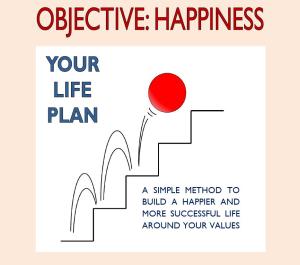A few days ago, I saw on CNN the title of one of the topics of the day: “What really makes people happy”. A whole program!
Of course, this being a dear topic of mine, I clicked on the link and read this article, written by a collaborator at the Oprah Magazine. If it is linked to Oprah, it has to be true.
Well, I read it, and like most article on the subject, it gives a number of examples of what makes some people happy. It also refers to some professor and some science about hormones, since we have to try to explain everything. It mentions the connectedness between people, and being involved in something bigger than yourself. To that, I yawned and said blah blah blah, because once you are finished with that article, you honestly have not learned much, if anything.
So here we are, with a bit of science, a bit of spiritualism, a bit of humanism, a bit of metaphysics trying to find the absolute recipe for happiness, the ultimate quick fix. And out there, you can find an army of people who try to sell exactly that. This is just like the get-rich-fast-and-safely non-sense. It does not really exist, and that is a good thing, because that feeling of earning what you have is so much more satisfying!
Happiness simply does not come to you that way!
In my life, I have helped many people to express their potential, I have opened their eyes, I have transformed their lives for the best, and I have made them achieve things that they did not even think they could ever do. And I have developed all those “techniques” on myself as well. Therefore, I know firsthand what works and what does not.
And here is the simple truth about happiness: there is no universal or absolute method on how to be happy. However, there are a few truths about the process of becoming happier.
Happiness is being in balance with yourself and your environment
 In order to be happy, you need to know yourself. This sounds obvious, and yet because of lack of self-awareness, many people look for answers in all the wrong places, and can spend their whole lives being unhappy.
In order to be happy, you need to know yourself. This sounds obvious, and yet because of lack of self-awareness, many people look for answers in all the wrong places, and can spend their whole lives being unhappy.
Then, you also need to know your environment. Who are your friends, your relatives, your colleagues, your neighbours. Do you really want them? Are they bringing you what you are looking for? Are you in the right place or do need to consider a change? And is that change about your environment or about you?
You must incrementally meet your needs and your values through action and objectives
Everyone has his/her very own and very specific cocktail of values, needs, desires, goals and dreams. It comes from their personality, their upbringing, their education, their social circle, you name it. This is why what makes one person happy does not necessarily bring any satisfaction to someone else.![Reaching your goals one step at a time j0438395[1]](https://happyfuturegroup.files.wordpress.com/2009/05/j04383951.jpg?w=450) The first step to increase your level of happiness is to identify the ingredients of that cocktail. The following steps are about setting targets on how to meet those values and needs more as time goes by. Trying to satisfy needs you do not really have, will not work on the long-term. Just look at a child at Christmas: the new toys are exciting the first day, a bit less the next day and soon they will be boring. The toys met a short-term desire, in most cases inspired by outsiders, especially marketers, but did not answer a true deep wish. And I am sure that you can find many similar examples of meeting the wrong needs. It might bring short-term satisfaction, because a nice surprise is always nice, but it will not last because it is not the right answer.
The first step to increase your level of happiness is to identify the ingredients of that cocktail. The following steps are about setting targets on how to meet those values and needs more as time goes by. Trying to satisfy needs you do not really have, will not work on the long-term. Just look at a child at Christmas: the new toys are exciting the first day, a bit less the next day and soon they will be boring. The toys met a short-term desire, in most cases inspired by outsiders, especially marketers, but did not answer a true deep wish. And I am sure that you can find many similar examples of meeting the wrong needs. It might bring short-term satisfaction, because a nice surprise is always nice, but it will not last because it is not the right answer.
Having objectives, or you can call them wishes, desires, dreams, is of utmost importance to be happy. It gives a feeling of purpose to your life, and therefore to you! Objectives are powerful drivers to grow and gain wisdom. If you doubt this, just try to imagine having to spend the rest of your life with no goal at all. How does that idea make you feel?
This is not a passive process; you must have a plan, practice and train regularly
To do the above, nothing beats making a plan. It has to be a plan shaped around your values, in which you will determine your needs and set up a number of steps and set time lines to achieve them.
Happiness will not fall upon you per accident. If you want to be happy, you need to want to be happy. Nothing nice will happen to you unless you initiate the process and keep its momentum going.
Happiness will not stay with you, unless you nurture it. You have to work on being happy on an ongoing basis. If you stop your efforts, you will see your level of fulfillment drop over time. Being happy is an active process, and just like sport, your performance at it will decrease if you become complacent. And this is where so many fail at happiness: it takes discipline and persistence.
Happiness is not about being in a state of permanent bliss. It has its ups and downs. Being happy does not mean that you never experience negative feelings like disappointment or frustration. This happens, and it happens to all of us. But truly happy people know how to find the resources to overcome such negative feelings, to refocus on what will make them feel good, and take the proper action to correct that temporary setback.
So, now you know how it works. Have you noticed that I do not bring any explanation that involve money, religion, spiritualism, love, friendship, meditation, science or any of the so many terms that usually are used when talking about happiness. That is simply because they are all valid, but they are not all valid for all of us. Everyone must choose what works for them!
For those of you interested in the CNN link here it is: What really makes people happy
Copyright 2009 The Happy Future Group Consulting Ltd.



 Posted by Christophe Pelletier
Posted by Christophe Pelletier  We all know the feeling of having to deal with an emotionally loaded happening or decision, or when we need to communicate about something emotional for the other person(s).
We all know the feeling of having to deal with an emotionally loaded happening or decision, or when we need to communicate about something emotional for the other person(s).
 In no particular order of course, you will notice that happy people:
In no particular order of course, you will notice that happy people: From early childhood, we all have had our ideas and dreams about how life would be later. You know, when I grow up, I want to…
From early childhood, we all have had our ideas and dreams about how life would be later. You know, when I grow up, I want to… When hiring people, I have heard many times their claiming to be perfectionists, either as one of their top three qualities or one of their top three “weaknesses”. Actually, it has always sounded to me like everyone wants things to be “perfect” all the time.
When hiring people, I have heard many times their claiming to be perfectionists, either as one of their top three qualities or one of their top three “weaknesses”. Actually, it has always sounded to me like everyone wants things to be “perfect” all the time. The best way to achieve this is to make a short plan of the activities you want to be done before the end of the day. Remember that failing to plan is planning to fail.
The best way to achieve this is to make a short plan of the activities you want to be done before the end of the day. Remember that failing to plan is planning to fail. It is rather easy to sort people in either one of these two groups. They have very specific and very different behaviors.
It is rather easy to sort people in either one of these two groups. They have very specific and very different behaviors. Empathy is one of those qualities that is acknowledged as being important, but for which there is little training given. One reason probably is that empathy, like some other personality traits, one is born with it more than one can learn it. Yet, there are certain patterns that can be acquired and help people interact with their fellow men better.
Empathy is one of those qualities that is acknowledged as being important, but for which there is little training given. One reason probably is that empathy, like some other personality traits, one is born with it more than one can learn it. Yet, there are certain patterns that can be acquired and help people interact with their fellow men better. In order to be happy, you need to know yourself. This sounds obvious, and yet because of lack of self-awareness, many people look for answers in all the wrong places, and can spend their whole lives being unhappy.
In order to be happy, you need to know yourself. This sounds obvious, and yet because of lack of self-awareness, many people look for answers in all the wrong places, and can spend their whole lives being unhappy.![Reaching your goals one step at a time j0438395[1]](https://happyfuturegroup.files.wordpress.com/2009/05/j04383951.jpg?w=450) The first step to increase your level of happiness is to identify the ingredients of that cocktail. The following steps are about setting targets on how to meet those values and needs more as time goes by. Trying to satisfy needs you do not really have, will not work on the long-term. Just look at a child at Christmas: the new toys are exciting the first day, a bit less the next day and soon they will be boring. The toys met a short-term desire, in most cases inspired by outsiders, especially marketers, but did not answer a true deep wish. And I am sure that you can find many similar examples of meeting the wrong needs. It might bring short-term satisfaction, because a nice surprise is always nice, but it will not last because it is not the right answer.
The first step to increase your level of happiness is to identify the ingredients of that cocktail. The following steps are about setting targets on how to meet those values and needs more as time goes by. Trying to satisfy needs you do not really have, will not work on the long-term. Just look at a child at Christmas: the new toys are exciting the first day, a bit less the next day and soon they will be boring. The toys met a short-term desire, in most cases inspired by outsiders, especially marketers, but did not answer a true deep wish. And I am sure that you can find many similar examples of meeting the wrong needs. It might bring short-term satisfaction, because a nice surprise is always nice, but it will not last because it is not the right answer.
 In my life, I have heard this question often and I also heard all sorts of answers, varying from one extreme to the other. Yet, there seems to be a majority of people who seem to think that intelligence is an impediment for happiness.
In my life, I have heard this question often and I also heard all sorts of answers, varying from one extreme to the other. Yet, there seems to be a majority of people who seem to think that intelligence is an impediment for happiness. Secondly, just observe the people. In the great places to work for, people exude happiness. They will smile at you in the corridors and they will say hello. Beware of the workplaces where you will not even get eye contact, forget about a smile.
Secondly, just observe the people. In the great places to work for, people exude happiness. They will smile at you in the corridors and they will say hello. Beware of the workplaces where you will not even get eye contact, forget about a smile. Just as an example, I illustrate this with the warning on packs of cigarettes. You would think that the warning is crystal clear. Yet, it does not stop some from keeping on smoking, almost like it is a cure for cancer. They know it is quite unhealthy, but simply decide to ignore the warning.
Just as an example, I illustrate this with the warning on packs of cigarettes. You would think that the warning is crystal clear. Yet, it does not stop some from keeping on smoking, almost like it is a cure for cancer. They know it is quite unhealthy, but simply decide to ignore the warning.








